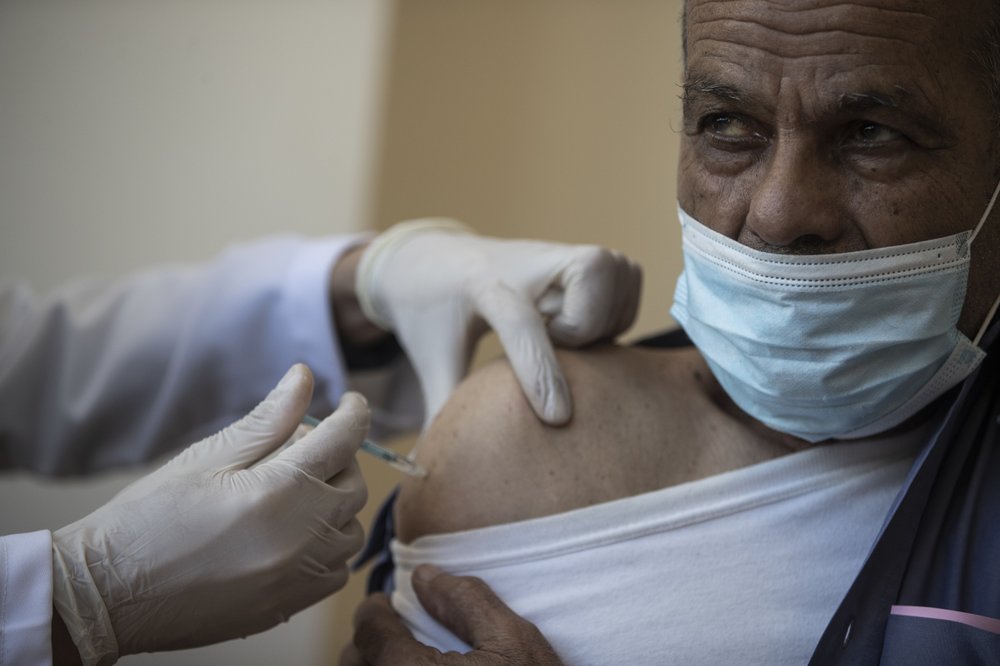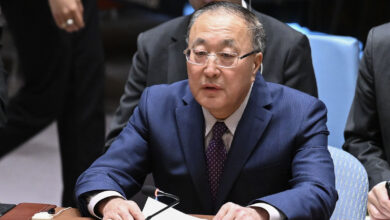
Earlier this week Mahmoud, an Iraqi civil servant, had an appointment for a COVID-19 vaccination appointment in Baghdad. The 34-year-old had easily been able to register for an AstraZeneca injection. But he didn’t go to the hospital.
“The Europeans said it wasn’t safe,” explained Mahmoud, who didn’t give his full name because he works for an Iraqi government ministry and staff are not supposed to talk to media.
Mahmoud has other, slightly more unfounded reasons too. “The vaccine has come here so fast,” he told DW. “But that’s so strange. In Iraq, with things like this, you usually can’t get access without some corruption, or you have to pay somebody. But it [the vaccine] is for free and it’s available for everybody. It’s a bit suspicious,” he said.
Vaccination hesitation a global health threat: WHO
Despite being well educated and even knowing three people who died of COVID-19, Mahmoud is what’s known as “vaccine hesitant.” This is different to being an anti-vaxxer. Immunization experts define it as a “delay in acceptance or refusal of vaccination despite availability.”
In 2019, the World Health Organization listed vaccine hesitancy as one of top 10 threats to global health. More recently, data scientists have said that the idea of “herd immunity” against COVID-19 is endangered by vaccine hesitation because herd immunity requires a faster rollout of immunization campaigns.
A number of surveys would seem to suggest that Mahmoud is far from alone in the Middle East. “The Middle East was among the regions with the lowest vaccine acceptance rates globally,” reported a January study published in the medical journal, Vaccines, that looked at willingness of people to be vaccinated around the world.
The researchers were particularly alarmed about vaccine acceptance rates of just 23 percent in Kuwait and 28 percent in Jordan.
Many choosing to wait for the jab
There are similar stories coming out of other Middle Eastern nations.
In Iraq, a January study by local researchers found that, of 1,069 locals surveyed, almost all would eventually take the vaccine. However the same survey also found that — just like Mahmoud — almost two-thirds, 64 percent, would wait before getting a jab.
A poll of over 27,000 Egyptian medical students, also from January, came up with similar results: Almost all the students eventually intended to get vaccinated, but 46 percent wanted to wait. At the end of March, a US-based study noted that 52 percent of all Egyptians were not sure or unwilling to be vaccinated.
A February telephone surveyof 1,219 Tunisians discovered that only about a third wanted to vaccinate.
In Lebanon, local officials have blamed vaccine hesitancy for the slow pace of registrations on the government’s official portal for vaccinations. By April 15, only around 17 percent of the Lebanese population had registered.
Informal public opinion surveys in the Houthi-controlled parts of Yemen by journalists from independent media outlet, Daraj, found that most people there were not enthusiastic about COVID-19 vaccines either. In a February poll they conducted of 121 residents in the city of Aden, over 84 percent didn’t want to be innoculated.
A matter of trust
From the various surveys, it’s clear that vaccine hesitancy in the Middle East is partially based on the same safety concerns: a fear of the potential side effects, and the speed at which the COVID-19 vaccine was developed.
But where countries like Iraq, Tunisia and Lebanon really differ from others is the low level of trust they have in local government and public health care systems. Ongoing work by the Arab Barometer, which studies public opinion in the Middle East, has long found that, on average, many citizens don’t have a lot of faith in their own governments’ performance, believing it to be corrupt, inept or both.
Some Arab nations have been more successful in managing the pandemic response and vaccination rollouts. This can be explained by quicker, harder lockdowns — such as in Morocco, early on in the health crisis — or cooperation with vaccine manufacturers, such as the ongoing work with Chinese state-owned company Sinopharm in the United Arab Emirates.
This may also correlate with the higher rates of willingness to be vaccinated in those regions. For example, in March, 82 percent of residents in the UAE wanted to be vaccinated, according to YouGov’s online tracker. A February phone survey of 1,238 Moroccans found that 88 percent were satisfied with their government’s handling of the crisis, while a whopping 91 percent were willing to be vaccinated.
Conspiracy theories fuel distrust
There could be another reason for increased vaccine hesitancy in this region: high levels of disinformation.
In some countries, such as the UAE or Saudi Arabia, media is more tightly controlled — and so is the official messaging on vaccinations, explained Mahmoud Ghazayel, a Lebanese expert in open source verification. In March, surveys suggested 62% of residents of Saudi Arabia were willing to be vaccinated.
But in other countries like Iraq, where the majority of media outlets are funded by, or aligned with, opposing religious or political groups, locals don’t trust mainstream news. So they get their information elsewhere.
“People are turning not only to ‘alternative’ media and news websites but to groups on [messaging apps] WhatsApp or Telegram, or to Instagram, all of which are free to publish whatever they want, with no restrictions or verification,” Ghazayel told DW.
It’s there that Arabic speakers find lies about how COVID-19 vaccines could contain traces of alcohol or pork — something Muslims may never ingest — or how vaccines are a plot to alter the genetics of Muslim babies. Strange antidotes are also touted on social media. In March, 46 percent of Tunisians told pollsters from the Partnership for Evidence-Based Response to COVID-19 that they thought the illness could be cured by herbal remedies.
Changes in attitude
“A reliance on social media as the main source of information about COVID-19 vaccines was associated with vaccine hesitancy,” confirmed Jordanian researchers who published a January study looking at vaccine conspiracy theories in Jordan and Kuwait.
The good news is that vaccine hesitancy fluctuates. Market research company YouGov has been tracking attitudes to vaccines since November 2020 and has noted growing acceptance in many countries. And as vaccinations gather pace in some Arab countries, local authorities are also becoming more aware of the need to deal with vaccine hesitancy.
There is no compulsory vaccination in the Middle East as yet. Instead, governments in the region are increasingly making certain privileges and positions contingent on vaccination.
Last Monday, Iraqi Prime Minister Mustafa al-Kadhimi issued a new set of health rules for the country. This included a compulsory certificate of vaccination or immunity for all health workers, for retail store staff and those working in hospitality.
Governments in Saudi Arabia, Bahrain and the UAE have taken similar steps, making vaccination compulsory for certain jobs.
“In my opinion, the best way to deal with the high level of vaccine hesitancy is to give clear, truthful and transparent messages … at all levels but especially from key figures, religious leaders and women,” Hazem Rihawi, a Syrian expert in public health working with the American Relief Coalition for Syria in the US, told DW. “The importance of vaccination has always been enshrined in our societies and we need to remind people of that.”
By Cathrin Schaer
IMAGE: A Palestinian man receives a shot of the Russian-made Sputnik V coronavirus vaccine, at an UNRWA clinic in Gaza City, Wednesday, March 17, 2021. The Palestinian Authority says it will receive 62,000 coronavirus vaccine doses through a World Health Organization partnership designed to help poor countries. (AP Photo/Khalil Hamra)




